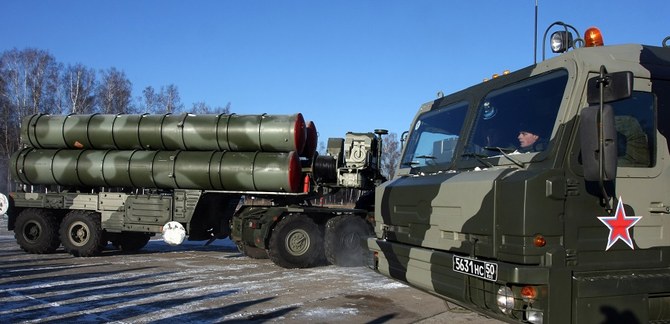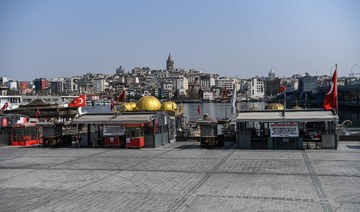ANKARA: Turkey’s plans to activate the Russian-made S-400 air defense system have been postponed due the coronavirus disease (COVID-19) outbreak, according to a new Reuters report, halting for now an emerging crisis between Ankara and Washington that could lead to sanctions.
However, this delay should not be understood as a change of Ankara’s priorities as Turkish President Recep Tayyip Erdogan and his government has repeatedly reassured the public that he will stand by the plan to activate system.
“The S-400s are now our property. All parts have arrived, and (the systems) will become operational in April,” Erdogan recently told journalists on March 5 after he met his Russian counterpart Vladimir Putin in Moscow.
Reuters reported that a senior Turkish official said the delay could extend for several months due to some “technical issues.”
Aaron Stein, director of the Middle East program at the Foreign Policy Research Institute, cast doubt on the claim that there is a technical delay.
“The Russian press indicates that Turkish crews have been trained and all the components have been shipped. My guess is that the technical delay is tied to Turkish economic concerns linked to COVID-19 and Ankara’s efforts to begin liquidity swaps with the US Federal Reserve,” he told Arab News.
The $2.5 billion system was delivered to Turkey last July, but its acquisition has put Ankara under risk of falling foul of the US Countering America’s Adversaries Through Sanctions Act (CAATSA), a specific menu of 12 options to penalize countries buying defense equipment from Russia.
The potential economic sanctions under this law, especially in a time when Ankara is also willing to receive some external financing, would constrain the Turkish economy. The so-called “technical issues” could be a pretext for buying some time against US Congressional sanctions.
On Monday night, the US State Department spokeswoman said that Washington continues to object “strenuously” to Turkey’s purchase of Russian missile defense systems and is “deeply concerned” by reports about Ankara’s continuing efforts to activate the weapons.
“We continue to stress at the highest levels that the S-400 transaction is the subject of ongoing CAATSA sanctions deliberations and it remains a major obstacle in the bilateral relationship and at NATO. We are confident that President Erdogan and his senior officials understand our position,” the spokeswoman said.
Erdogan and his US counterpart Donald Trump held a phone call on Sunday, allegedly over their cooperation during the global pandemic crisis.
The US alleges that the S-400s are incompatible with the NATO defense system and is concerned that they could endanger US-made F35 fighter jets. Although Turkey was due to get new jets, Washington removed it from the jet program as a retaliation to the S-400 contract last year.
Another possible explanation for the delay concerns Turkey’s changing priorities and alliances in Syria, where it needs a strong support from NATO allies, such as the US, against Russia’s moves. Ankara is especially vexed by Russian activity in the rebel-held northern province of Idlib.
Turkey recently accused the Syrian Assad regime of violating the Idlib ceasefire and warned of potential major retaliations.
Amanda Sloat, a senior fellow at Brookings Institution, said the Turkish decision to delay making the S-400s operational provides a window of opportunity for Ankara and Washington to find a way forward.
“If the systems had been activated in April as originally planned, Congressional pressure on the Trump Administration to sanction Turkey under the CAATSA legislation would have increased significantly,” she told Arab News, adding: “Sanctions would have placed financial pressure on Turkey’s economy, which was already struggling before the coronavirus emerged.”
The presumed backpedaling on the activation date came amid some new steps for rapprochement with Washington as Turkey approved an export permit to sell medical equipment and ventilators parts to the US to help the combat against COVID-19.
Dr. Can Kasapoglu, a defense analyst at the Istanbul-based EDAM think tank, said that the term “activation” is militarily vague.
“It was first voiced by US Secretary of State Mike Pompeo to allow some diplomatic maneuvering for Turkey. The CAATSA wording itself does not include such a clause, but only mentions significant transactions,” he told Arab News.
Kasapoglu added that Turkey has already radar-tested the system, and received the interceptor missiles.
“Technically, three is no reason to assume the system is not ‘activated’ yet given what we know. The only remaining step is a live fire exercise. But, for the time being, Turkey would not continue with the live fire exercises.”
Kasapoglu said that Turkey insisted on the working group as a show of good will.
“However, the mistrust is essentially emanating from the Russian technological dominance over the system,” he noted.
Caglar Kurc, an Ankara-based researcher on defence, approached the issue from another angle.
“Why would Russia care about S-400 activation anyway? Moscow sold the system and got its money. On top of that, they were able to create a rift, or deepen an existing rift, between Turkey and the US,” he said.
Meanwhile, Russian and Turkish forces conducted a joint military patrol on the Latakia-Aleppo M4 Highway on Tuesday.
Turkey recently asked the US to deploy two Patriot missile defense batteries on its southern border to deter Russia in Syria.
Ozgur Unluhisarcikli, Ankara office director of the Washington-based German Marshall Fund think tank, said the US could deploy the Patriot missiles in Turkey for a year if Ankara commits against activating the Russian system in the same period.
“If the time gained by Turkey’s delay to activate the S-400s is not used well by both Ankara and Washington it could amount to a pause before an even bigger crisis in the relationship,” he told Arab News.



































